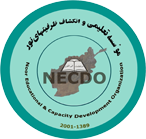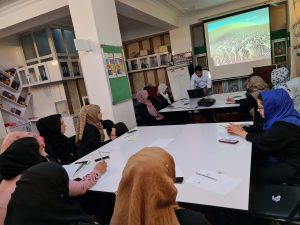
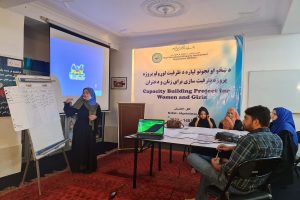
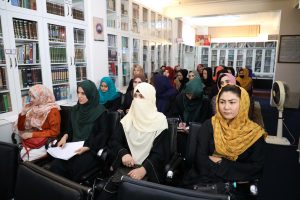
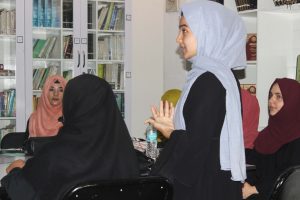
A: who were most of the participants?
Whole number of the participants are 30, divided in three group as below.
School teachers, University Students & Imams, and the majority of participants are women.
B: what is the youngest and oldest participant age?
The age of participants is between 19 to 60 years.
C: How do you assess the interest of the participants?
The interest of the participants in this project was high because the participants were interested in the topics of the trainings, leadership, advocacy, and networking as well as concept writing and reporting, in addition, they also received financial support.
1- Summary of the activity:
The training of the capacity building project, as mentioned above, was set up in three groups.
- Imams
- University Students
- School Teacher
Each group received training for three days in the second round. The training was starting from 9:00 AM and continued until 3:00 PM each day. During this period, the trainees had a refreshment time at 10:00 AM in the morning and from 12:00 to 01:00 there was a lunch break and prayers time based on the agenda.
During this training deferent type of methodologies are adopted like discussions, brain storming, flip charts presentation, group works, assignment, flash card and everyday evaluation.
Agenda for Imams second round from 17/07/2022 to 19/07/2022
First day: leadership.
Second day: Report writing
Third day: internet usage and Frist Aid
Each day the sessions begin with recitation of the Holy Quran, evaluation of last training (Questions), assignment collection, multimedia presentation of mentioned subjects as above, refreshment served, flash card introduction of mentioned subject by trainees, brainstorming, flip chart, group works and its presentation to all and test at end of the training.
Agenda for School Teachers Second round: 25/07/2022 to 27/07/2022
First day: Project Management
Second day: Third day: Five basic rights of women from the perspective of Islam
Third day: Networking and First Aid
Based on agenda each day the sessions begin with recitation of the Holy Quran, evaluation of last training (Questions), homework’s(assignment) collection, multimedia presentation of mentioned subjects as above, refreshment, flash card introduction of mentioned subject by trainees, brainstorming, flip chart, group works and its presentation to all and test at end of training.
Agenda for University Students second round: 05/07/2022 to 07/07/2022
First day: Project Management
Second day: Third day: Five basic rights of women from the perspective of Islam
Third day: Networking and First Aid
Based on the agenda each day begin with recitation of the Holy Quran, evaluation of last training (Questions), homework’s (assignment) collection, multimedia presentation of mentioned subjects as above, refreshment, flash card introduction of mentioned subject by trainees, brainstorming, flip chart, group works and its presentation to all and test at end of training.
2- Details of the Activity:
In this training, the most useful topics are selected and participants were trained accordingly.
Teachers: Project Management, Five basic rights of women from the perspective of Islam, Networking and first aid.
Project Management: introduction to project and project management, scientific fields of project management, Project time management, budgeting, risk management, quality management, human resources management etc…
Five basic rights of women from the perspective of Islam: rights of Inheritance, rights of marriage, rights of property, rights of work. And rights of participation in society and politics.
Networking: introduction to networking, basic elements of networking, benefit of networking, important point of a good networking and Elements that are necessary to maintain the network
First Aid: are taken in action when accidents occur and to prevent death, injuries and subsequent complications, and reduce the pain and suffering of the injured before reaching the doctor and health centers.
Frist Aid trainers: Dr. Edris Sadat and Dr. Marina Najebi from Roghtia institute health and science.
Imams: leadership, Report writing and internet usage
Leadership: introduction to the Leadership, types of leadership whit its introductions, how can a leader can reach its goals, positive points of leadership and negative points of leadership, moral of a good leader, duty and responsibilities of a leader.
Reporting: introduction to the Reporting, types of reporting, basics of reporting, process of reporting, planning of reporting, writing of report, evaluation of reporting. An example of reporting.
Internet usage: Gmail, Google drive, Google contact, Google map Google meet Google search and Google earth
First Aid: are taken in action when accidents occur and to prevent death, injuries and subsequent complications, and reduce the pain and suffering of the injured before reaching the doctor and health centers.
University Students: Project Management, Five basic rights of women from the perspective of Islam and Networking.
Project Management: introduction to project and project management, scientific fields of project management, Project time management, budgeting, risk management, quality management, human resources management etc…
Five basic rights of women from the perspective of Islam: rights of Inheritance, rights of marriage, rights of property, rights of work. And rights of participation in society and politics.
Networking: introduction to networking, basic elements of networking, benefit of networking, important point of a good networking and Elements that are necessary to maintain the network
First Aid: are taken in action when accidents occur and to prevent death, injuries and subsequent complications, and reduce the pain and suffering of the injured before reaching the doctor and health centers.
I was everyday evaluating trainees during their activity in training hall and by evaluating them from test paper, as their test papers showed magnificent improvements.
3- Findings:
Findings from the implementation of second round of this project shows that the participants are motivated even they decided to practically start an advocacy for student of school that they are not allowed to attend school and in my point of view they are eager in such programs and are completely satisfied with the methods of training and the facilities which is provided to them by the NECDO, at the same time they want us to extend this program. And presented their special thanks to the NECDO and saying that in such a situation that women are deprived of several of their rights is the best time to achieve knowledge and get involved in capacity building and social engagement for the development and betterment of women´s and girls´ skills and knowledge.
As mentioned above, the topics of Imams in the second round were selected with the advice and suggestions of the Imams and in cooperation of NECDO administration, one of these suggested topics were the use of new technology (computer and internet).
Subject are Internet usage (Gmail, Google drive, Google contact, Google map Google meet Google search and Google earth), Leadership and Report writing; these subjects are trained as per our plan and agenda and especial methods training are adopted even they practiced practically.
In conclusion I find out that most of our trainees which are women they are so much eager to learn and they want to be active they show more interest in administrative subject as they said that they will find jobs or currently some of them are working as teachers, as it seems they want to improve their administrative skills, but in group of Imams as I got their knowledge according to Islamic subject are good enough.
And one other point that should be noted is that their presenting and speaking skills are developed well.
4- Factual Story:
Teachers
One of our trainee from teachers group who was struggling to get her inheritance from one of her relatives and could not get it, according to her own words, she was about to give up about her right, and she did not know how to defend her inheritance right. After receiving effective methods of advocacy and knowledge of inheritance in behave of Islam, she decided to act more seriously because she knew the scientific ways of receiving her right after receiving the training of inheritance and advocacy.
Students
During training of university students while training of project management was in progress we were presenting a video about construction process of Burj Khalifa and trainees find out that how this Burj is made, trainees amazed about it and wished that one day we have same project in our own country.
Imams
In last day of our Imams training we had trained them about using of Google features which most of them were not familiar whit it and it was so interesting for them event they requested us to extend training of using new technology further more at end of training each of them created an account for them self.
5- Evaluation of the activity:
The evaluation of the trainees is done according to the plan and agenda, as they had a pre-test on the first day of the each training, in this evaluation (examination), their level of knowledge was comprehensively evaluated against the topics of the training, and their evaluation shows that their knowledge were very basic accordingly.
evaluations that we had every day after the completion of the training showed a huge difference in their knowledge level, such that the average score in the evaluation (pre-test) was 15 out of 100, but their average score after receiving the training was higher than 85. This variance shows positive changes of 70% at all.
The activities of the trainees during the training were always under supervision and an effort was to give sufficient and active participation to the trainees, so that methods such as group work, brainstorming and discussions were used in the training, in which, the role of the participation activity is raised and caused training entertaining and interesting.
6- Your suggestions for improvement:
The suggestions that we received from the participants during second round are presented as below.
- Extension of computer training (internet) for more ten days (Imams)
- Training of Miracles of the Holy Quran and Islamic sciences (Imams)
- 5 day Capacity building training for Imams in structure of the Islamic system (Imams)
- Adding subject related to administrative issues (teachers)
- Training of time management (University Students)
Safe Educational and Working Environment from Sexual Harassment for All
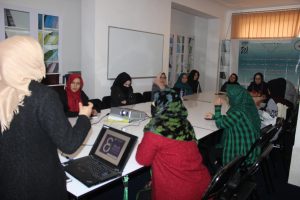
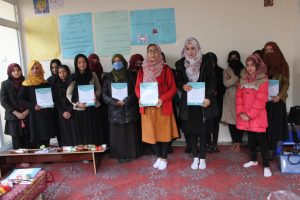
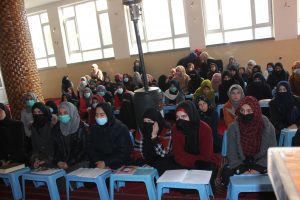
-
Executive Summary:
Please provide an executive summary: In maximum 250 words, please give a general project description (purpose, geography, beneficiaries, etc.) and expected impact, the activities and outputs of this reporting period, and any outcomes that are already apparent. Please note that this summary will be used for public communications and management reporting.
This project ‘Safe Educational and Working Environment from Sexual Harassment for All’ is aimed to empower and sensitize 25 influential Imams as advocates to fight against sexual harassment in Kabul in the light of international laws and from Islamic perspective who will mobilize and empower 50 more Imams in two other provinces to sensitize with acquired knowledge and expertise on reduction of sexual harassment. The project is being implemented in Kabul, Ningarhar and Herat provinces in two phases reaching to 2,000 university students (girls and boys) through Focussed Group Discussions as well as around 1,000,000 public via speeches of the trained/mobilized Imams in Friday Khutbas and ceremonies. In addition, due to the COVID 19 Pandemic the second portion of the project to raise awareness of the public and common man on safety and precautions the first 2 months of the project focussed on publication and distribution of posters in both Pashto and Dari languages, recording and boosting of video clips by Imams and broadcasting of radio spots nation wide.
The project started on 1st Sept 2020 as soon as we received the agreement and signed it. We began our by responding to the COVID-19 pandemic in terms of awareness to the target beneficiaries and public. The tools used for raising awareness were designing and dissemination of 2,000 posters; production of 40 video clips of awareness messages by the trained (women and men) religious scholars and boosting them to the social media as well as broadcasting of 20 radio spots to the public.
Meanwhile networking was done with the MORA, MOWA, MOEC, MOE, AIHRC and civil society organizations. MORA was requested through a formal letter to introduce 25 of influential Imams, who were assessed by NECDO and a committee was established. The project continued with its second component (fighting harassment) in November 2020, by establishing a committee of six experts from among the 25 already selected Imams for developing a manual on how to prevent sexual harassment by using Islamic teaching and the national laws. The views of university students, as the key target beneficiaries of the project also collected and incorporated in the manual, which is now waiting for approval of OSA.
- Activities:
2.1 Staffing and Planning:
Soon after the agreement was signed, NECDO put an announcement in ACBAR website for the project manager (coordinator) position, CVs were collected and sorted a short list was developed and a date was set for the written test. 27 women participated and the test was successfully held. Right after the test the top papers were shortlisted and a date was set for interviews, priority was given to women, five women were interviewed and section and the project manager was selected.
2.2 Response to COVID-19 Pandemic (Sep – Oct 2020)-Option B
2.2.1 Designing of 2000 Posters & Distribution List:
NECDO designed 2,000 posters in both national languages (1,000 in Dari, 1,000 in Pashto) related to awareness on COVID-19 and distributed them in the 3 target provinces the details are in below table.
| LOCATION | DARI | PASHTO |
| Kabul | 500 | 500 |
| Herat | 350 | 150 |
| Ningarhar | 175 | 325 |
Decision on the number of posters in each province took place based on the proportion of each language speakers. For instance, in Kabul province the Dari and Pashto speakers are almost equal, so the same number was considered for both languages. In Herat, majority of population speak Dari, so bigger amount in Dari language distributed. In contrast, majority of Ningarhar population are Pashto speakers, therefore more Pashto posters were distributed in this province. The posters were used in public spaces, hospitals, schools, universities, mosques, markets and government institutions.
2.2.2 Production of 40 Video Clips through Photography Media Company
The photography media company, which was contracted by NECDO for making video clips, created 40 video clips of speeches of the men and women religious scholars/Imams Kabul provinces as descried in the table below. The clips were made in a professional and well-recorded manner.
| LANGUAGES | Men | Women |
| Dari | 20 | 5 |
| Pashto | 9 | 6 |
2.2.3 Socialization of Video Clips:
In order to disseminate the video clips in wider community, NECDO contracted an IT company (Circles IT Solution). Our admin team used to post the videos on Facebook and the contracted company was keeping on boosting the videos on daily basis. Each video was boosted for 3 to 4 days, and more than 500K beneficiaries viewed. All the videos were reached to different age group users and received the feedback through comments. The maximum number of viewed video audience reached to above 76,496 while the lowest number of viewed audience was 367 for each video. Form gender disagrigation perspective, men made 91% of the total audience against 9% women. The below Pie charts reflect the percentage of the provinces where videos were viewed by all age group individuals.
Information Chart # 1:
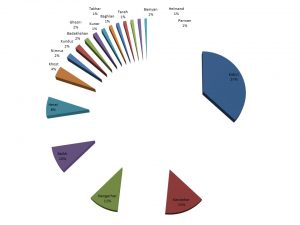
Information Chart # 2:
The below table shows the number of reached audience for each video clip in social media
| No. | Clip | Reach |
| 1 | Clip #1 | 2,590 |
| 2 | Clip #2 | 2,287 |
| 3 | Clip #3 | 19,188 |
| 4 | Clip #4 | 45,751 |
| 5 | Clip #5 | 367 |
| 6 | Clip #6 | 27,415 |
| 7 | Clip #7 | 8,638 |
| 8 | Clip #8 | 922 |
| 9 | Clip #9 | 11,140 |
| 10 | Clip #10 | 10,912 |
| 11 | Clip #11 | 9,330 |
| 12 | Clip #12 | 62,320 |
| 13 | Clip #13 | 29,142 |
| 14 | Clip #14 | 11,144 |
| 15 | Clip #15 | 14,289 |
| 16 | Clip #16 | 1,582 |
| 17 | Clip #17 | 1,420 |
| 18 | Clip #18 | 1,292 |
| 19 | Clip #19 | 7,978 |
| 20 | Clip #20 | 22,600 |
| 21 | Clip #21 | 18,936 |
| 22 | Clip #22 | 38,160 |
| 23 | Clip #23 | 39,928 |
| 24 | Clip #24 | 76,496 |
| 25 | Clip #25 | 801 |
| 26 | Clip #26 | 699 |
| 27 | Clip #27 | 3,124 |
| 28 | Clip #28 | 3,858 |
| 29 | Clip #29 | 9,754 |
| 30 | Clip #30 | 16,812 |
| 31 | Clip #31 | 1,558 |
| 32 | Clip #32 | 2,310 |
| 33 | Clip #33 | 1,023 |
| 34 | Clip #34 | 2,115 |
| 35 | Clip #35 | 1,226 |
| 36 | Clip #36 | 9,296 |
| 37 | Clip #37 | 5,428 |
| 38 | Clip #38 | 4,786 |
| 39 | Clip #39 | 24,762 |
| 40 | Clip #40 | 9,330 |
The table demonstrates that maximum number of viewed video audience is above 76,496 while the lowest number of viewed audience is 367 for each videos.
2.2.4 Broadcasting of Radio Spots through SALAM WANTANDAR:
An agreement was made with Salam Watandar Radio Broadcasting Channel in order to broadcast the 20 Radio spots (Dari and Pashto) on different occasions in order to raise awareness about COVID-19. Moreover, they were requested to repeat the telecast twice in different timings. Hence, the radio spots were broadcasted nationwide once in peak hours and twice in off-peak hours.
In order to monitor and evaluate the broadcasts; therefore, we asked the broadcasting provider to give us a soft copy of the broadcast in CD so that we can have a record of the broadcasted spots.
- Fighting Harassment (Option A):
To implement the project in effective way and on time, it is crucial to build a better networking with facilitating partners. The main facilitating partners for this project are Ministry of Religions Affairs (MoRA), and Ministry of Women Affairs (MoWA), Ministry of Religious Affairs AIHRC and Civil Society Organizations (CSOs). The headquarters of the partners were expected to introduce the project to their provincial departments and cooperate in implementation of the project. To this end, the following activities were planned and implemented during the reporting period.
3.1 Introduction of the project to the Line Ministries:
The project manager held meetings with the Ministry of Religious Affairs and Ministry of Women Affairs, Ministry of Education and introduced the project to them through official letters. She also verbally requested them to introduce the project to their provincial departments and the two provinces, Herat and Ningarhar, for implementation of the second phase of the project.
The Project Manager also met the Deputy Minister (Islamic Education) of MoRA and requested him to introduce the project to Madrasas (religious schools) in Kabul provinces.
3.2 Hiring the MT (Master Trainer):
Based on the plan, soon after the support letter and list of the Ulama was taken from MORA, due to the pandemic we could not hire the training consultant from outside Afghanistan (as it was planned in the concept), we were reluctant to announce the position in ACBAR website to hire from local cadres. A written test and interviews were conducted accordingly and a qualified MT was hired.
3.3 Selection of Imams for Capacity Building:
The Project Manager was introduced to MORA by an official letter to meet the General Director of Afghanistan Mosques of MoRA and brief him about the Project and particularly the role of Imams in implementation of the Project. At the same meeting, the Project Manager suggested the Director to introduced 25 Imams to work with the Project and these Imams will participate in developing suitable information about Sexual Harassment in perspective of Quran and Hadith, national and international laws. Hence, Ministry of Religious Affairs and the Deputy Talimat-e- Islami of MoE introduced a group of Imams to support the consultant, and taking active part in developing of the manual in the light of their knowledge, research of Quran and hadith and to finalize the manual on sensitization about Sexual Harassment.
3.4 Developing the Sexual Harassment Manual:
As the first step, on Nov 16th 2020, towards developing a manual for the project, the Master Trainer of the project selected a group of six experts (out of 25) Imams and formed a committee (This committee consist those Ulama who had experience and skill of the writing and were better in education). The committee started their works by organizing the contents for the manual in a logical and coherent manner and drafted an outline for the manual as below.
- Definition of harassment and sexual harassment
- Frequent sexual harassment experienced
- What is sexual harassment and what are its components?
- What if woman is interested in the man also? Does it happen to man also?
- Between whom does sexual harassment occur?
- What are the causes of sexual harassment?
- What are the effects/side effects of sexual harassment? And what should be done about it?
Audio and video clips of awareness raising on both national languages would be developed and shared in social and public media
- What is the view of Islam on the issue of sexual harassment
- What type of sin is the issue of sexual harassment
- What was the specific saying of Holy prophet on this issue
- What are the main verses of Quran on this issue
- What Islamic Fiqha says about it
- How Muslim could deal with such an issue in Islamic initial days
Then started writing of the details for each topic.
In the second session (18 Nov 2020), the Master trainer (consultant) with collaboration of the Ulama committee worked on finalizing the first chapter of the manual (definition of discrimination and sexual harassment, its kinds and types). In this session the committee also discussed the title of the manual and the Introduction part. They named the manual as Elimination of Women Sexual Harassment – Legal and Islamic Guidelines.
In the third session, (22 Nov 2020), the committee worked on the second chapter of the manual, which included the type of sexual harassment, who are harassing, who are being harassed and those who have the power and authorities. The committee also discussed about causes and reasons of the sexual harassment and exchanged their experiences. The committee put together the contents under specific and relevant headings and subheadings and prepared a consolidated draft of the chapter.
In the fourth session (25 Nov 2020), the Committee worked on the third and fourth chapter of the manual. In the third chapter, they elaborated and analyzed the causes and reasons of sexual harassment, while in the fourth chapter they analyzed the effects of sexual harassment. The analysis included physical, mental and social effects of sexual harassment on the victims. They also identified solutions on how to avoid harassment taking into consideration the causes and reasons of the harassment as well as how to mitigate the effects. They proposed all the solutions in the light of sharia and laws.
In the fifth session (29 Nov 2020), the Committee drafted the fifth chapter of the manual, which included the verdicts of sexual harassment in the light of Sharia, national laws and international conventions. In Sharia, the explored the verdicts in accordance to the versus of Holy Quran as well as orders of Prophet Mohammad (peace be upon him) i.e. Hadith.
In addition, in order to enrich the draft manual by including the views and day-to-day experiences of the target groups of the status of sexual harassments in an educational sitting, the Master Trainer suggested the Committee to collect the views of the students from the target universities in a one-day focused group discussion (FGD). The Committed welcomed the suggestion and tasked the Mater Trainer to design a survey questionnaire for the said purpose. The Master Trainer then formulated the required information about the topic into a set of specific questions. After collection of the questionnaires, the Committee analyzed the collected information and incorporated them into the first draft of the manual.
In the sixth session (02 Dec 2020), the Committee consolidated the manual and reviewed it deeply in the light of Sharia, national laws and international conventions. The also organized the contents of the manual in a logical sequence as the first draft for further review and revisions.
In the seventh session (06 Dec 2020), the Master Trainer invited a workshop of all 25 Imams to review the draft manual and share their comments and views with the manual development committee. Out of the 25 Imams invited, 18 attended the workshop and thoroughly reviewed the draft manual. They shared their views and comments with NECDO. Then the Master Trainer, incorporated their views and comments in the final draft of the manual. The final version was submitted to OSA for their review and approval. At the same time, the Master Trainer (consultant) started translation of the manual, into Pashto language. The manual was originally developed in Dari language.
- Challenges:
- During the second month of the project implementation, the PM (Project Manager) got a severe health problem and was advised by the doctors to travel abroad for the treatment. As the project was in its initial stage it put in trouble; fortunately, we had a second option in the short list of the already interviewed candidates. Thus, we offered her the position and do the project orientation, within two weeks. The second project manager got her house burned and her newly borne daughter got sick and due to this she also had to quit the job. We had to conduct another round of test and interview and select a new manager, Ms. Shabana Mayel, for the position.
- Security situation is in general a big challenge. So in order to be in safe side, we kept a low profile in our movements outside the office and our field work.
- Another challenge the project faced was lack of a standard studio for recording the video clips of the religious leaders/Imams (women and men). Although, this challenge could overcome by contracting a local Radio/TV station, but on the other hand, some of the religious leaders, especially the women, did not want to come to any Radio/TV station for recording their clips because of security threats to them. Therefore this challenge remained as a limitation, however, the work was successfully accomplished despite the challenges
- Looking Forward:
As soon as we get the approval from of the manual, as we are eagerly waiting for, we have already done all the preparations to start our trainings for the imams (25 imams) and follow up with the following activities.
- Monitoring Information:
Please fill out the tables below with applicable information that will assist OSA to contact and speak with relevant individuals regarding this project. If a category of individual is not applicable to this project, please simply skip and fill out those that are. Please leave the grayed out notes section blank for OSA staff to use.
